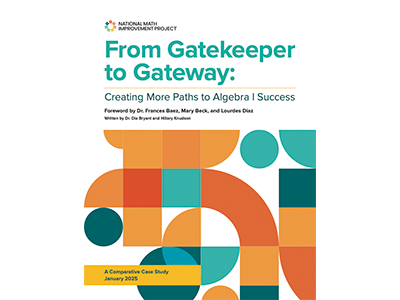
edWebinars
«Back to all edWebinars- This event has passed.
Creating Paths to Algebra I Success: From Gatekeeper to Gateway
Thursday, March 20, 2025 @ 1:00 pm - 2:00 pm EDT

Presented by Dr. Corey Morrison, Director of Mathematics, Chicago Public Schools (IL); Dr. Frances Baez, Chief Academic Officer, Los Angeles Unified School District (CA); Hillary Knudson, Vice President, Whiteboard Advisors; and Dr. Dia Bryant, NMIP Lead Facilitator, Context Matters Strategy Group
Sponsored by National Math Improvement Project
Watch the Recording Listen to the Podcast Read the Article
Learn more about viewing the live presentation and the recording, earning your CE certificate, and using our new accessibility features.
Algebra I is a critical gateway to advanced mathematics and future academic success, yet systemic barriers continue to limit access and opportunity for many students, particularly those from historically underserved communities. View this illuminating discussion with leaders from three of the nation’s largest school districts who are pioneering innovative approaches to ensure all students can thrive in Algebra I.
Drawing from a new case study examining successful district initiatives, this recorded edLeader Panel brings together academic officers from Chicago Public Schools, Los Angeles Unified School District, and Miami-Dade County Public Schools who will discuss how districts can transform Algebra I from a gatekeeper into a gateway of opportunity. Don’t miss this chance to hear directly from district leaders about concrete strategies for:
- Creating multiple on-ramps to algebra success
- Building teacher content knowledge and instructional expertise
- Expanding early access programs and acceleration pathways
- Fostering positive math identity and student belonging
- Using data to inform and improve algebra readiness efforts
View the conversation about making Algebra I success achievable for all students. This recorded edLeader Panel is of interest to middle and high school district leaders.

About the Presenters
Dr. Corey Morrison is the Director of Mathematics at Chicago Public Schools, where he leads the math office in the department of STEM. He is dedicated to fostering positive math identities among students and teachers and believes all students can succeed in math when lessons are centered around joyful and culturally rich tasks. Throughout his career, he has championed creative ways to provide access and opportunities for all students to achieve advanced levels of mathematics. Dr. Morrison has served as a math teacher, department chair, and most recently, the Assistant Principal of Kenwood Academy, where he oversaw the math and science departments. Dr. Morrison holds a bachelor’s degree in theoretical math, a master’s degree in math education from The Ohio State University, and an Ed.D. from the University of Illinois at Chicago.

Dr. Frances Baez is the Chief Academic Officer of the Los Angeles Unified School District, serving more than 460,000 students in the nation’s second-largest, diverse district. In her role, she leads UTK-12 grade instruction, instructional technology, CTE/Linked Learning, Community Schools, and Beyond the Bell programs. Dr. Baez has served school communities on behalf of students for more than 29 years as a teacher, principal, director, and local district superintendent. She is a twin and one of three daughters of an immigrant mother born in Zacatecas, Mexico, and attended public schools in LAUSD. Dr. Baez’s goal is to eliminate obstacles for students to achieve in Pre-K-12 and help them achieve their dreams. She holds a Ph.D. in urban education from Claremont Graduate University and a bachelor’s from UCLA.

Hillary Knudson is a seasoned education policy expert committed to improving equitable access to high-quality learning opportunities. Alongside the lead facilitators, she directs the strategy and content of the National Math Improvement Project, a community of practice that brings together six of the nation’s largest school districts to advance mathematics instruction at scale. Previously, Hillary served as Deputy Chief of Staff at the Tennessee Department of Education, where she co-authored the state’s Every Student Succeeds Act (ESSA) plan and led major initiatives focused on high-quality instructional materials, early post-secondary opportunities, and accountability. She was instrumental in developing the state’s school improvement model and managing the annual assessment task force, collaborating with the largest districts to drive systemic change. As Vice President at Whiteboard Advisors, Hillary advises a range of education organizations, including nonprofits, foundations, and edtech companies, on navigating the intersection of education policy and practice.

Dr. Dia Bryant specializes in advising and training urban superintendents to build and sustain high-performing district teams. Launching her career 20 years ago as a New York City Teaching Fellow, she has left an indelible mark on New York’s education landscape, serving as an educator, school founder, teacher trainer, Special Assistant to the First Deputy Chancellor, and Executive Director of the Education Trust-New York. With extensive experience in educational leadership, Dr. Bryant has a proven track record in instructional design, equitable school improvement, and change management. Dr. Bryant is a Detroit native who holds a bachelor’s in economics from Kalamazoo College, a master’s in math education from Brooklyn College, and a doctorate in education leadership from the Harvard Graduate School of Education.
Learn more about viewing the live presentation and the recording, earning your CE certificate, and using our new accessibility features.
Join the Building Math Proficiency community to network with educators, participate in online discussions, receive invitations to upcoming edWebinars, and view recordings of previous programs to earn CE certificates.
Six of the nation’s largest urban school districts—Chicago Public Schools, Houston Independent School District, Los Angeles Unified School District, Miami-Dade County Public Schools, New York City Public Schools, and the School District of Philadelphia—have come together to form the National Math Improvement Project (NMIP). NMIP districts collectively serve nearly 2.5 million students, the majority of whom are students of color and/or students living in poverty. While each district faces its own unique, local context and dynamics, the group shares challenges rooted in the sheer size and scale of their agencies, as well as the diverse student populations they serve.
Together, academic leaders from these districts have committed to collaborate over the course of three years through a community of practice focused on (1) implementing high-quality core and supplemental instruction and materials in math; (2) increasing educator capacity; and (3) building math mindset in students, educators, and society. This project aims to elevate best practices and shared learnings in support of academic outcomes, educator capacity, and math mindsets.




